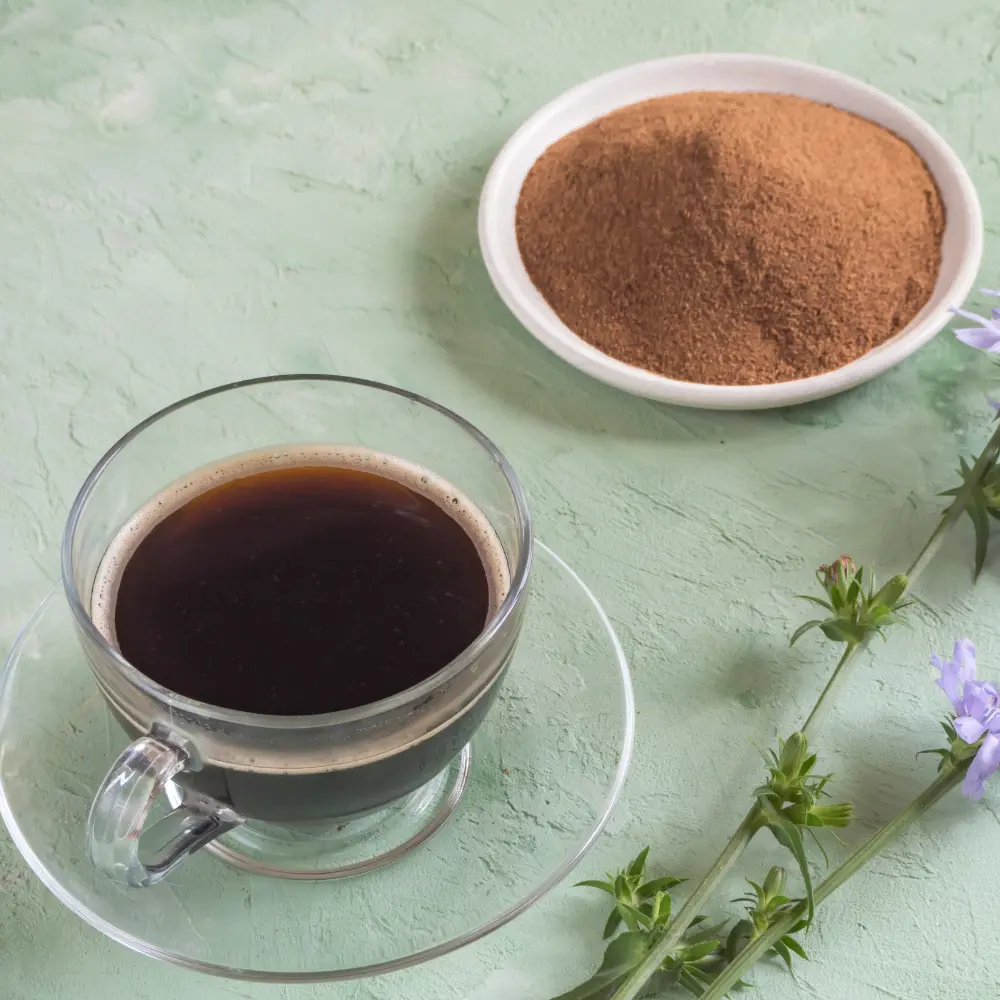Welcome to our comprehensive exploration of the delightful world of chicory coffee! If you’ve ever found yourself wondering, “What is chicory coffee?” or if you’re interested in how coffee with chicory has woven itself into the fabric of beverage history, you’re in the right place.
This distinctive type of coffee is a rich, full-bodied drink that offers a unique alternative to traditional coffee. It’s been cherished for centuries across cultures, and for good reasons. The depth of flavor, the potential health benefits, and the ease of preparation have made it a favorite choice for many coffee lovers seeking variety and novelty in their daily cups of brew.
In our ultimate guide, we’ll traverse through the intriguing history of this beverage, delve into the research-backed health benefits it offers, and even guide you on how to make this unique brew at home.
Whether you’re a coffee connoisseur, a chicory enthusiast, or a curious reader, we invite you to join us on this exciting journey. Let’s discover together the fascinating world of coffee with chicory.
Chicory Coffee: Key Takeaway
- Chicory Coffee’s Rich History: Chicory has a rich history that spans centuries, originating as a coffee substitute during economic hardships and war times. Today, it’s enjoyed worldwide for its unique flavor and health benefits.
- Health Benefits of Chicory Coffee: This drink is a good source of inulin, a type of prebiotic fiber, which can support digestive health, heart health, and help manage blood sugar levels and weight. Its lower caffeine content also makes it an attractive choice for those looking to reduce their caffeine intake.
- Making Chicory Coffee at Home: You can make this beverage at home using the same methods you would use for regular coffee. The process involves choosing the right chicory root, roasting and grinding it, and then brewing it to your liking.
- Comparing Chicory Coffee and Regular Coffee: This coffee blend has a distinctive, robust flavor and lower caffeine content than regular coffee. However, when chicory is blended with coffee, the caffeine content depends on the percentage of coffee in the blend.
- Popular Chicory Coffee Brands: Several brands, including Café Du Monde, Community Coffee, and French Market Coffee, offer unique blends. These brands cater to a variety of taste preferences, making it easier than ever to enjoy this unique beverage.
The History of Chicory Coffee
This delectable coffee has a rich, fascinating history that is as unique as its flavor profile. Its journey spans continents and centuries, from ancient civilizations to the modern coffee shops of today.
Origins of Chicory as a Coffee Substitute
The chicory plant, a hardy perennial with vibrant blue flowers, has been known to humans for thousands of years. Its roots, when roasted and ground, yield a substance with a flavor remarkably similar to coffee.

But why was chicory used as a coffee substitute in the first place? The answer can be traced back to Europe in the 18th century, particularly France. In the 1800s, a coffee shortage led to the French experimenting with chicory as a coffee substitute. They discovered that the roasted chicory root produced a beverage that was not only similar in taste to coffee but was also cheaper and more readily available. This usage quickly spread across Europe and, eventually, to other parts of the world. (1)
Chicory Coffee During the Civil War
Fast forward to the United States, during the Civil War. Blockades in Southern ports resulted in a significant scarcity of coffee. Resourceful Southerners sought alternatives to their beloved drink and found it in the form of chicory coffee. As in Europe, chicory was abundant, inexpensive, and offered a similar flavor profile to coffee.

New Orleans, a city with a deep love for coffee, became a major center for this delightful coffee during this period. The tradition has persisted to this day, and chicory coffee is considered a signature drink of the city, often served with the famous beignet.
Chicory Coffee in Modern Times
In the present day, this concoction enjoys popularity not just as a coffee substitute, but as a beverage of choice in its own right. Beyond its distinctive flavor, the potential health benefits of this delightful coffee have also garnered attention. Chicory is rich in inulin, a type of prebiotic fiber that promotes digestive health, which has helped elevate its status among health-conscious consumers. (2)

Moreover, the resurgence of interest in traditional and artisanal food preparation methods has also played a role in this coffee’s modern appeal. From boutique cafes in Brooklyn to chic coffee houses in San Francisco, this coffee is being rediscovered and appreciated by a new generation of coffee aficionados.
So, whether it’s for the love of its unique taste, its health benefits, or its rich history, this distinctive coffee continues to hold a cherished place in the world of beverages, reminding us of our ability to innovate and adapt even in challenging times.
The Health Benefits of Chicory Coffee
In addition to its unique flavor and rich history, it is also celebrated for its health benefits. The main ingredient, chicory root, is a powerhouse of nutrients and provides several health advantages. Let’s delve deeper into the numerous benefits of this delectable coffee that have won the hearts of health-conscious consumers worldwide.
Digestive Health Advantages
One of the most significant health benefits of chicory root coffee lies in its positive impact on digestive health. As mentioned earlier, chicory root is high in inulin, a type of prebiotic fiber that stimulates the growth of beneficial bacteria in the gut. These bacteria play a crucial role in numerous aspects of health, including digestion and nutrient absorption. (3)

In addition, inulin aids in relieving constipation and improving overall bowel function. The fiber content in chicory root coffee can help maintain regular bowel movements and promote a healthier digestive system.
Potential Heart Health Benefits
Chicory coffee benefits may extend to heart health as well. Some studies suggest that the inulin in chicory root can help reduce the levels of ‘bad’ LDL cholesterol in the body. High levels of LDL cholesterol are associated with an increased risk of heart disease and stroke. (4)

While more research is needed to fully understand the potential heart health benefits of this beverage, these preliminary findings are promising.
Blood Sugar and Weight Management
Chicory might be a good choice for those looking to manage their blood sugar levels and maintain a healthy weight. The inulin present in chicory is a complex carbohydrate and doesn’t cause the rapid spikes in blood sugar that simple sugars do. This makes this distinctive coffee an excellent option for people with diabetes or those following a low-glycemic diet. (5)

Moreover, because inulin is a type of fiber, it can also contribute to feelings of fullness. This can potentially help control overeating and aid in weight management.
Remember, while chicory coffee has several potential health benefits, it should not replace a balanced diet or regular medical care. Always consult with a healthcare provider when making significant changes to your diet or nutrition plan.
How to Make Chicory Coffee at Home

Learning how to make this delectable beverage at home can be a delightful and rewarding experience. The process involves a few key steps: selecting the right chicory root, roasting and grinding the root, and finally brewing your chicory root coffee. Let’s take you through each step of the process to prepare your perfect cup of coffee with chicory (or on its own).
Choosing the Right Chicory Root

The first step in making this delectable coffee is selecting the right chicory root. While you can find the root in the wild in many parts of the world, for consistency and safety, we recommend purchasing it from a reputable source. Many health food stores and online retailers offer dried, raw chicory root specifically intended for making coffee. Look for organic chicory root if possible, to ensure it hasn’t been treated with any harmful chemicals.
Roasting and Grinding Chicory Root
Once you have your chicory root, it’s time to roast and grind it. This process is remarkably similar to the way coffee beans are prepared:
- Preheat your oven to 350°F (175°C).
- Cut the root into small, even pieces. Aim for about half an inch in length.
- Spread the root pieces in a single layer on a baking sheet.
- Roast the chicory in the preheated oven for about an hour, or until they’re a rich brown color. Be sure to stir occasionally to ensure even roasting.
- Once roasted, let the chicory cool completely.
- After it’s cooled, grind the roasted chicory in a coffee grinder until it reaches a similar consistency to ground coffee.
Brewing Techniques for Chicory Coffee

With your grounds prepared, you’re all set to brew your chicory blend or pure root. You can brew your coffee, which is a blend of coffee and chicory root, or brew just the root, much in the same way as you would brew regular coffee. Here are the steps for a straightforward brewing method:
- Add one tablespoon of the grounds to your coffee filter for every cup of water in your coffee maker. If you’re brewing your coffee and prefer a stronger brew, feel free to add more.
- Brew the chicory as you would regular coffee.
- Once brewed, pour the coffee into a cup. Add milk, and sugar, or enjoy it black, according to your preference.
And voila! You now have a delicious, homemade cup of chicory coffee or brewed root. Remember, making these beverages at home is more art than science. Feel free to experiment with the amounts and brewing methods until you find the perfect brew that suits your taste. Enjoy the journey!
Brewed Chicory vs. Chicory Coffee vs. Regular Coffee

A common query that arises for those exploring the world of this concoction is, “How does it stack up against regular coffee?” To shed light on this, we need to delve into the differences and similarities between chicory coffee (which often refers to a coffee-chicory blend) and traditional coffee. We’ll be focusing on their taste profiles, caffeine content, and nutritional differences.
Comparing Taste Profiles
Taste is a pivotal factor when it comes to coffee, chicory coffee, and regular coffee each brings their unique sensory experiences to the table.
Chicory coffee typically offers a rich and somewhat woody flavor, coupled with an underlying, natural sweetness that’s reminiscent of caramel. It’s also known for its reduced acidity compared to regular coffee, which is often appreciated by those who find the acidity of regular coffee discomforting to their stomachs.

Regular coffee, on the other hand, spans a vast spectrum of flavors. Depending on the type of bean, the roast level, and the brewing technique, its taste can range from sweet and fruity nuances to dark and bitter tones.
Both beverages have distinct flavors that cater to different palates. However, it’s not uncommon to find enthusiasts who enjoy a blend of chicory and regular coffee. This combination capitalizes on the strengths of both, creating a brew that is both richly flavorful and less acidic.
Remember that while chicory coffee does have caffeine due to the presence of coffee in the blend, it’s generally less caffeinated than a pure cup of coffee. For those seeking a completely caffeine-free experience, brewed chicory (without coffee) serves as an excellent alternative, offering a similar flavor profile without the kick of caffeine.
Caffeine Content Comparison
One of the most significant differences between this concoction and regular coffee lies in their caffeine content. If you’re wondering, “Does chicory coffee have caffeine?”, the answer isn’t quite as simple as yes or no.

Pure brewed chicory root is naturally caffeine-free. This makes it an excellent option for those who are sensitive to caffeine, wish to limit their caffeine intake or enjoy a cup of coffee-like beverage later in the day without the sleep disruption caffeine can cause.
However, it’s important to note that “chicory coffee” often refers to a blend of coffee and chicory, and this blend does indeed contain caffeine, albeit usually less than regular coffee. The caffeine content in these blends can vary based on the percentage of coffee included.
In contrast, regular coffee contains a significant amount of caffeine, with the exact amount depending on factors such as the type of coffee bean, how strongly it’s brewed, and the serving size. For individuals looking to manage their caffeine intake, understanding these differences can be instrumental in making the right beverage choice.
Overview of the Caffeine Content in Popular Caffeinated Drinks
To help you better understand the caffeine content in various popular drinks, we’ve compiled a comparison that includes everything from tea and coffee to chicory blends and energy drinks. Here’s how they measure up:
- Brewed Chicory: 0 mg of caffeine per 8 oz serving – The root is caffeine-free.
- Chicory Coffee (blend): 30-60 mg of caffeine per 8 oz serving – When chicory is blended with coffee, the caffeine content depends on the percentage of coffee in the blend.
Tea
- Matcha: 30-70 mg of caffeine per 8 oz serving – The caffeine content in matcha can vary depending on the quality and type of matcha used.
- Green Tea: 20-45 mg of caffeine per 8 oz serving – The caffeine content in green tea can fluctuate based on steeping time and the specific type of green tea.
- Black Tea: 40-70 mg of caffeine per 8 oz serving – Much like green tea, the caffeine in black tea can vary based on several factors, including the type of black tea and the steeping time.
Coffee
- Espresso: 63 mg of caffeine per 1 oz serving (standard espresso shot) – Espresso typically has more caffeine per volume compared to other drinks due to its concentrated nature.
- Brewed Coffee: 95-200 mg of caffeine per 8 oz serving – The caffeine content in brewed coffee can vary significantly based on factors like the type of coffee bean, the brew strength, and the brewing method.
Other
- Energy Drinks: 80-150 mg of caffeine per 8 oz serving – The caffeine content in energy drinks can vary greatly depending on the brand and specific product. While some can have relatively modest caffeine content, others can exceed the caffeine content of a strong cup of coffee.
Remember, these are average values and actual caffeine content can vary depending on numerous factors. If you’re trying to monitor or limit your caffeine intake, it’s always a good idea to check the caffeine content for the specific brand or type of tea, coffee, or other caffeinated beverage you’re consuming.
Nutritional Differences
When comparing the nutritional profiles of this particular coffee blend and regular coffee, it’s crucial to understand that both have unique benefits. Regular coffee is rich in antioxidants and has been linked to a reduced risk of several diseases.

On the other hand, the root in the chicory coffee blend is a good source of inulin, a type of prebiotic fiber that can support digestive health. The coffee blend does contain caffeine due to the inclusion of coffee, but generally, less than a cup of pure coffee, making it a viable option for those wishing to limit their caffeine intake. If you’re aiming for a completely caffeine-free option, then a cup of brewed chicory (without coffee) would be your go-to choice.
However, it’s worth emphasizing that none of the blends mentioned above should be considered a significant source of nutrients in comparison to a well-rounded, varied diet.
To sum up, both chicory coffee blend and regular coffee offer their distinct characteristics and benefits. Your preference will ultimately depend on your taste, nutritional needs, and lifestyle choices. Whether you’re a coffee blend enthusiast, a traditional coffee lover, or enjoy savoring both, there’s a world of flavor and enjoyment to be discovered.
Top Chicory Coffee Brands
The landscape of these delectable coffee brands is as varied as the coffee world itself. In this section, we’ll delve into the profiles of three top chicory coffee brands, each with its unique approach to creating a memorable blend.
Café Du Monde

This iconic New Orleans brand is best known for its Coffee and Chicory blend, a staple in the city’s coffee culture. Café Du Monde’s chicory coffee is often served au lait, mixed half and half with hot milk.
- Rich Tradition: Café Du Monde has been in operation since 1862, instilling over 150 years of coffee-making tradition into each can of their coffee blend.
- Unique Blend: Their coffee blend is widely recognized for its robust and full-bodied flavor, offering a taste that’s distinctive and memorable.
- Versatility: Café Du Monde’s blend is not only great for making traditional coffee but also works wonderfully for creating cold brews.
Community Coffee

Community Coffee is a family-owned company that has been operating for over 100 years. Their Premium Ground Chicory & Coffee blend is noted for its smooth, balanced flavor profile.
- Family-Owned: Four generations of the Saurage family have run the company since its inception in 1919, ensuring quality and consistency in every product.
- Smooth Blend: Their coffee blend is often praised for its smoothness and balance, offering a less intense option for those new to this type of coffee.
- Commitment to Sustainability: Community Coffee is Rainforest Alliance Certified, reflecting its commitment to sustainable coffee production.
French Market Coffee

French Market Coffee, another New Orleans favorite, is known for its bold, strong flavors. Their Medium-Dark Roast Chicory blend is beloved by those who appreciate a more intense coffee experience.
- New Orleans Heritage: With over 125 years of history, French Market Coffee carries on the city’s rich coffee tradition in each of their chicory blends.
- Bold Flavor: Their Medium-Dark Roast blend is noted for its bold, intense flavor, appealing to those who prefer a stronger coffee.
- Variety: In addition to its popular blend, French Market Coffee also offers a wide variety of other coffee blends, catering to different taste preferences.
Conclusion
The world of this distinctive coffee is as rich and varied as the drink itself. From its humble beginnings as a coffee substitute during hard times to its current status as a beloved beverage enjoyed around the world, chicory has proven its staying power.
Whether you’re drawn to its unique taste, its impressive health benefits, or the tradition behind it, chicory offers something for everyone. Its lower caffeine content compared to regular coffee, coupled with its potential health benefits like digestive health support and potential heart health benefits, make it an attractive choice for many.
Learning how to make this concoction at home can be an enjoyable adventure, and the range of coffee brands available today means you’re sure to find the perfect blend for your palate.
So, whether you’re a seasoned coffee connoisseur or a curious newcomer, why not take a leap and try a cup of coffee with chicory? You might just discover a new favorite. Here’s to new experiences and good health, one cup of chicory at a time!
FAQ
What are the health benefits of chicory coffee?
This concoction offers several health benefits due to its high inulin content. This prebiotic fiber can support digestive health, potentially improve heart health, and help manage blood sugar levels and weight.
How can I make chicory coffee at home?
Making this type of coffee at home involves a process similar to brewing regular coffee. You'll need to choose the right root, roast, and grind it, then brew it using your preferred method. You can also buy pre-ground coffee blends to simplify the process.
How does chicory coffee compare to regular coffee in taste and nutritional value?
This coffee has a distinctive, robust flavor, often described as woody with a hint of natural sweetness. It has less caffeine than regular coffee and contains inulin, a type of prebiotic fiber. On the other hand, regular coffee's taste varies based on the type of bean, roast, and brewing method, and it's high in antioxidants.
What are the top brands selling chicory coffee?
Several brands are well-known for their coffee blends, including Café Du Monde, Community Coffee, and French Market Coffee. Each brand offers its unique blend and flavor profile, catering to a variety of taste preferences.






















